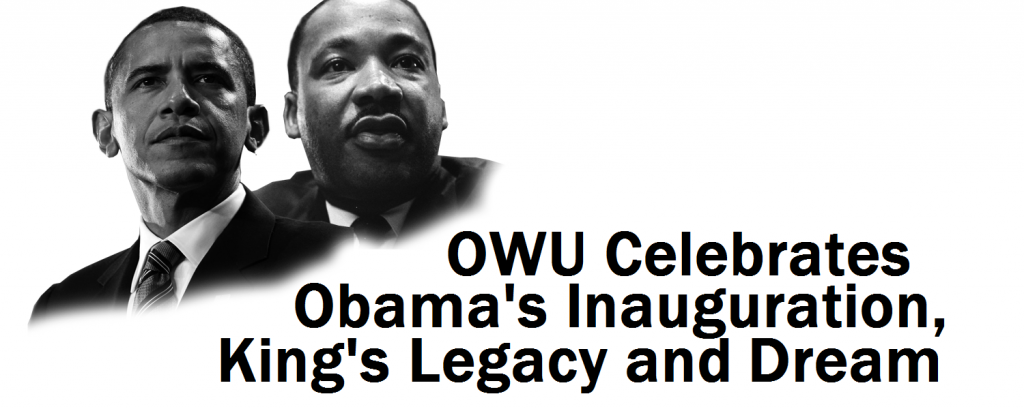
By Spenser Hickey
Assistant Copy Editor
The day before his assassination, the Rev. Martin Luther King Jr. said in a speech that he had been to the mountaintop and looked upon “the promised land.”
On Martin Luther King Day, the OWU community celebrated both King’s legacy and the second inauguration of President Barack Obama, a step toward King’s promised land.
The celebration began with a breakfast in the Benes Rooms, included a noon presentation on King by Black Men of the Future and ended with a lecture by Professor Emmanuel Twesigye on Obama’s inauguration and King’s dream.
The breakfast’s main speaker was the Rev. Albert Brinson, a friend of King’s who was ordained by both King and King’s father.
The on-campus breakfast, which was held for the 20th year in a row, was conducted by Rosalind Scott, chair of the MLK Celebration Committee.
OWU and the Delaware community have been holding events in honor of Rev. King for 45 years, including a march from the Liberty Community Center to Grey Chapel in January 1968, when King was still alive.
Scott said 350 people attended this year’s event, including Delaware residents, students, local businessmen, and people from the Columbus area.
While tickets were $20 per seat, student tickets were available for free, and students were allowed to go to the event instead of classes, something Scott said may not have been widely known.
Black Men of the Future held a presentation on King in Hamilton-Williams Campus Center at noon, playing part of King’s “I Have a Dream” speech. Members also spoke about King, read poems and displayed artwork of King.
Sophomore Shakira Braxton, president of the Student Union on Black Awareness, which includes BMF as an umbrella organization, said in an email that she was “appalled” by the OWU community’s response to the presentation.
She said that, even with a microphone, members of BMF had trouble making themselves heard over the noise.
“Members of our community thought its ridiculous that a program like that was not more positively received,” she said.
Twesigye’s lecture focused on the relationship between King and Obama and whether Obama’s second inauguration showed that King’s dream of racial harmony had been realized.
“Without King there wouldn’t have been an Obama,” Twesigye said.
Twesigye spoke and showed a Powerpoint with notes on King’s dream and whether it had been realized with Obama’s inauguration.
“King’s dream has been partially incarnated and realized in Obama,” one slide read. Twesigye also described how Obama’s inauguration reflected King’s life and legacy. One of the Bibles used to swear him in was King’s personal Bible and had been provided by King’s family with a request that the president sign it. Before the inauguration, Twesigye said, Obama visited the monument with his family and “paid homage” to King.
After the events, Twesigye, Braxton, university chaplain Jon Powers, and politics and government professor Joan McLean all spoke in interviews about King’s legacy.
Powers said he saw King as being part folk hero, part prophet, and said that the larger than life folk hero aspect is emphasized over the prophetic image, which challenges us to look at ourselves.
All four of them agreed that King’s vision of an America with racial harmony had not been fully reached.
McLean said that “parts” of the dream had been realized, but that King championed the rights of all who have not had access to the American dream.
“We still have poverty, we still go to war too often, in his eyes I believe,” McLean said. “We’ve moved closer, but there’s still lots of what was contained in the dream to be looked at.”
McLean also mentioned that while the nation has elected an African-American president twice, there have only been seven African-American senators in history.
Braxton said that while the election of Obama is a tremendous step, “social and institutional racism and the discrimination of all people” are still issues today.
Powers said that today was “a very different world” from when he grew up in the 1950s and 60s, when lynchings and segregation still took place.
“There’s cultural and practical things that have changed,” he said.
He still sees “rabid…racist hatred” in America though, particularly targeted toward Barack Obama.
Powers, who was in college when King and Robert Kennedy were assassinated, said he fears the President may be assassinated as well.
“It only takes … one crazy person and a magic moment,” Powers said. “I have that fear. I’m not a worrier or a fearful person; this isn’t the way I want to live my life.”
He added that while he grew up in “violent times,” violence still exists today.
“When a congresswoman can be gunned down in open air, when people go into a movie theater or an elementary school and start randomly shooting, I can’t imagine those things happening when I was growing up,” said Powers. “In some ways it’s crazier.”
Braxton, Powers and Tweisgye each said that increased education would help address the ongoing problem of racism. Braxton said ignorance is a big part of discrimination, and that people need to meet members of other races personally, rather than relying on media-based stereotypes.
Twesigye added that both sides need to work together to combat prejudice and injustice.
Powers praised the University for having minority groups such as SUBA, BMF, Sisters United, ProgressOWU and Horizons International, and for classes offered by the sociology-anthropology, politics and government and black world studies departments.
“I think that those of us who fervently believe in King’s vision need to not give up, but to keep pressing forward on [educating],” said Powers, who described himself as a “hopeless optimist.”